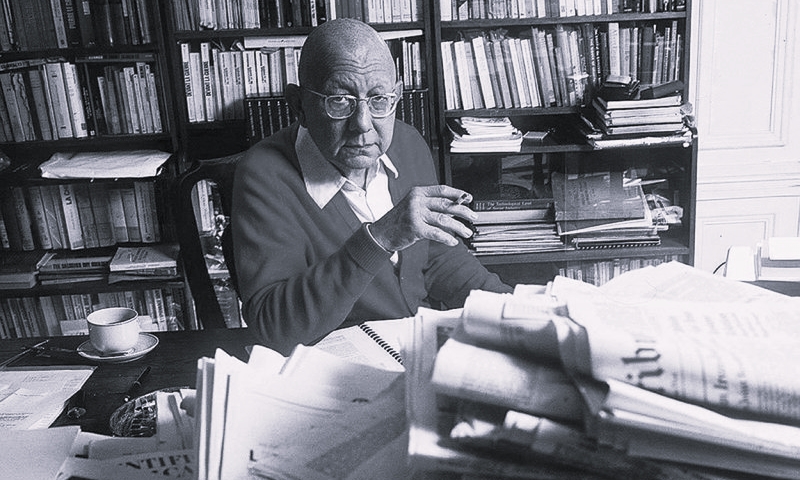
Stories Talk | Presentation Skills and Effective Storytelling
Stories Talk | Presentation Skills and Effective Storytelling
#philosopher #culture #thinker
By Mia Kollia
Translated by Alexandros Theodoropoulos
He was born in Constantinople on March 11, 1922 and shortly after the Greco-Turkish war of 1922, he went to Athens with his family. Throughout the years he was influenced by his family to a great extent. His father was a highly educated man, an atheist and an antiroyalist. His mother was also highly educated and loved music.
Cornelius Castoriadis started reading philosophy at the age of 11-12 and at the age of 13 he became involved in politics and social action. In fact, he was arrested and imprisoned as a member of an illegal communist party during the dictatorship of Metaxas. He studied law and economics at the University of Athens and in 1941 he joined the Greek Communist Party (KKE), which he left a year later to join the Trotskyist group of Spyros Stinas. This ended up in his persecution not only by the Germans but also by the KKE itself.
His Actions in Paris
In 1945 Castoriadis settled in Paris with a scholarship from the French Government, together with Costas Axelos, Costas Papaioannou, Iannis Xenakis and others. Since then, the French capital has been the core of his life and activities. After the fall of the Greek military junta, Cornelius used to visit Greece during the summers.
In Paris, he became a member of the Trotskyist Fourth International, but gradually began to distance himself and finally he left the Trotskyist movement for good in 1948. In the same year, he started working in the Statistics Office of National Accounts and Development Studies of the Organisation for Economic Cooperation and Development (OECD), a position he held until 1970.
In 1946, Castoriadis met intellectual Claude Lefort and together they founded the group Socialisme ou Barbarie ("Socialism or Barbarism") two years later. Until 1965 they also published a magazine of the same name. In the following years, French intellectuals such as Jean-François Liotard and Guy Debord found commong ground of thinking with and were inspired by this magazine.
Indicative of the magazine's line was Castoriadis' analysis of the political system of the Soviet Union, which he described as a regime of "Bureaucratic Capitalism". As for the "liberal democracies" of the West, he believed that the criterion for class differentiation was no longer the possession and control of the means of production, but the possession and ability to exercise power.

Although Castoriadis's positions were very popular in the revolutionary circles of many countries at the time, he didn't have the appropriate recognition, as he was forced to sign his articles using various nicknames (Pierre Chaulieu, Paul Cardan, Marc Noiraud, etc.). This happened because he didn't have French citizenship or a passport, so he was constantly in fear of being deported to Greece.
Some of the most important articles of the first period of his thinking appeared in the magazine "Socialism or Barbarism" and were later to be published through the publication of his books, such as "The Bureaucratic Society", "The Experience of the Labor Movement", "The French Society" and more.
Socialisme ou Barbarie was dissolved in 1967. However, two years later, the articles and the thoughts of the group and especially of Castoriadis were the main source of inspiration for the rebellious students of May '68.
Thoughts and Psychoanalysis
In 1970, the Greek philosopher acquired French citizenship. During this period, he turned to psychoanalysis and from 1974 he also worked as a psychoanalyst. That turn defined the whole of his thinking, which led him to a new philosophical understanding of the political and social life of man, which was reflected in his all-time-classic work "The Imaginary Institution of Society".
Central to his theory was the notion of the Imaginary as a fundamental element of human creation, which enables man to see himself as an autonomous subject that makes history.
He considered social differentiation as a process of continuous creation of meanings, signs and images, which structure the image of the world and society of each era. Castoriadis denied the existence of any prescribed course of society, as this is a continuous creation that is born and acquires meaning through the "Social Imagination".
In 1979 Cornelius Castoriadis was elected director of the École des Hautes udtudes en Sciences Sociales, where he held a seminar entitled "Institutionalisation of society and historical creation".
He maintained strong ties with Greece and in the last years of his life he gave many lectures in Greek universities. He was awarded an honorary doctorate from Panteion University (1989) and from the Pedagogical Department of Primary Education at the Democritus University of Thrace (1993).
He passed away four years later, on December 26, 1997.
#feature